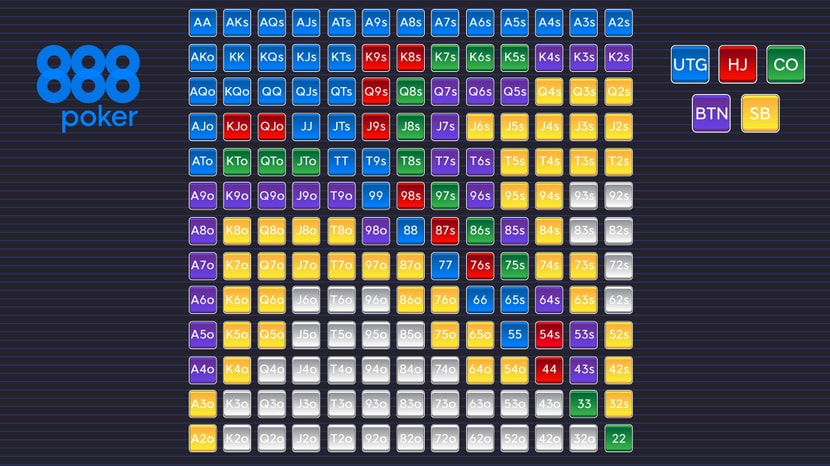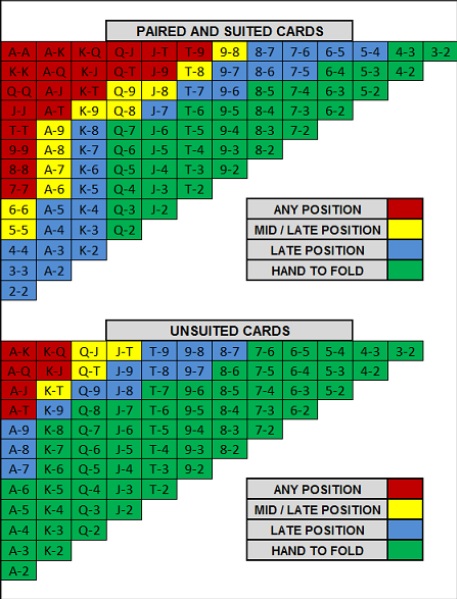Poker Starting Hand Selection
The starting hand table may look to be very strict, but this is simply a rough guide to help beginner players find their feet in Texas Hold'em. After you start to learn the game and become more experienced, you can start to open up your starting hand selection to incorporate different hands in different situations. However, if you are a new. Poker starting hands: playing the right cards at the right time The basic idea of poker is to play the strongest poker hands in early position, good hands in mid-position and a few more hands in the late (aka strongest) position. The Importance of Starting Hand Selection As you know Poker is a game of maths and probability. It is therefore possible to know which starting hands are most probable to win a hand and this has been statistically proven in many studies. GET my 30 Day Cash Game Strategy Program for FREE This Video will teach you How To Play Poker Basics, including what hands to play. Starting hand charts are training wheels, crutches. They keep you from doing the stuff of playing poker: critical, situational, analytical thinking. A rank amateur can look at a starting hand chart once and get some ideas about hands, but a chart itself is meaningless for one look.
Poker Starting Hand Selection Strategy
10:5530 Aug
Whether you’re an intermediate poker player looking to fine-tune your gameplay or a complete poker novice, understanding how to play the best starting hands is crucial to winning long-term at the tables. A solid starting hand selection is one of the fundamental building blocks of any winning poker strategy. The good news is it’s not rocket science either. It’s a case of playing the best possible hands at your disposal and folding the ones that aren’t so good.
The Top 2 Percent of Starting Hands


It’s a good idea to break the starting hands down into different phases. Phase one is the top 2 percent of starting hands, which are those that can provide you with significant leverage pre-flop. Such include cards like the AA, KK, QQ and a suited AK. The latter is considered equally as valuable as pairs of aces, kings and queens because this makes it more likely for you to land a flush — and the best possible flush at that.

Professional poker player Isabelle “No Mercy” Mercier has recently started a series of articles offering guidance on how to extract the most value from premium poker hands as possible in both short-handed and full-ring play. Mercier believes that the top 2 percent of starting hands are quite strong in short-handed games and that it’s critical to extract the maximum amount of value from these hands as possible. Beginner players will often be too scared to raise as they don’t want to put opponents off and make them fold, missing out on a sizable pot.
However, this doesn’t make sense for two reasons. Firstly, if opponents always muck their hands each time you bet or raise, it’s because you’re deemed a tight player and aren’t raising enough using other hands. Secondly, if you let too many players into a hand, your premium AA hand could easily be outdrawn by a small pocket pair if it hits three-of-a-kind on the flop. Ergo, don’t be afraid to get aggressive, not only with your premium hands but when you are in position, i.e., one of the last players to act on a hand and the furthest from the dealer button. Doing so gives you free information on the strength of most of your opponents’ hands before you even need to act.
Poker Starting Hand Selection Position
Try Not to be Too Wedded to the Second Phase of Starting Hands
Then there is the second phase of starting hands, which include the AK off-suit, AQ suited, JJ, KQ suited, AJ suited, AK off-suit and a pair of tens. Although this clutch of starting hands is potential winners, they are by no means invincible. Play them strongly in position when others are displaying weakness and don’t be afraid to fold them if a dangerous flop or turn card appears.
Don’t Be Afraid to Mix Up Your Bets/Raises

While the above strategy for premium starting hands is a good starting point for beginners, it can become a little too predictable if you only wait for the absolute “nuts” before getting involved in a hand — you’ll scare off too many of your opponents. As you develop a feel for the game and your opponents, you might want to consider limping (calling) into pots, even with premium starting hands, especially if there are only one or two players. They might get a piece of the flop, but still be well behind your starting hand, giving you significant leverage to show strength with your next bets.